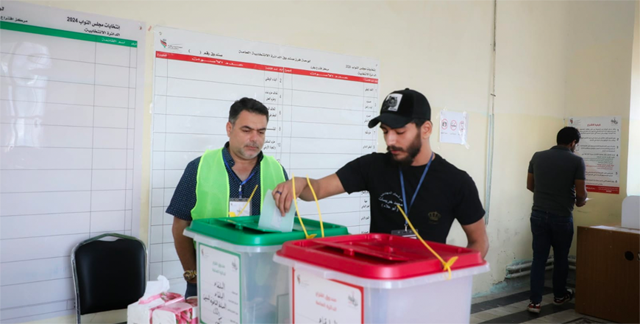AMMAN — The National Centre for Human Rights (NCHR) on Wednesday released its official report on the 20th parliamentary elections.
For the voting phase, the centre said it formed a team of 572 observers, with 474 deployed across polling stations nationwide, covering 28.7 per cent of polling centres and 8.19 per cent of ballot boxes, according to a NCHR statement.
The remaining observers worked in the field and in the operations room at NCHR to monitor the progress of the electoral process, the statement added.
To enhance the efficiency and speed of the monitoring process, the centre also said it introduced an electronic application specifically designed for election day monitoring.
The app included templates based on the legislative framework governing the electoral process, allowing observers to submit real-time updates, the NCHR said.
It also featured location tracking for observers at polling stations and allowed for manual completion of monitoring templates.
Additionally, a dedicated operations room was established to oversee the election process, including voting, counting, and final tallying.
The room also received complaints and observations, which were promptly forwarded to the Independent Election Commission (IEC) for resolution.
The findings from the NCHR’s monitoring indicated that the electoral process was marked by simplicity and clarity in the procedures, adding "No violations were reported that compromised the integrity, transparency, or neutrality of the elections."
The NCHR also said that it has submitted 93 observations to the IEC to safeguard the election's integrity throughout the election process, commending the IEC for its responsiveness in addressing these concerns.
The NCHR also provided a set of recommendations to further develop the legislative framework and procedures related to the electoral process.
Key recommendations included amending the 2022 Parliamentary Election Law to establish a quota for persons with disabilities in the House of Representatives.
The centre also recommended prohibiting internal elections that restrict candidates' freedom to run, as these practices negatively affect both voters’ and candidates’ decisions, especially in terms of preventing discriminatory practices against women.
Further recommendations included updating procedures for accrediting journalists, media personnel, and photographers to ensure they can access polling and counting rooms and fulfil their professional duties without disrupting the process.
The centre also suggested providing necessary facilities for observers, such as permitting the use of mobile phones in polling and counting rooms.
Other recommendations included utilising the Sanad application to verify voters' identities in addition to civil ID cards and ensuring greater voter privacy by positioning privacy screens in polling stations.
The NCHR also called for increased awareness campaigns to inform persons with disabilities about their ability to change polling and counting centres.
The centre also suggested establishing a database to determine the number of registered voters with disabilities, their percentage, and geographic distribution.
Also on Wednesday, the NCHR released a report on the legislative impact study of Jordan's Cybercrime Law No. 17 of 2023.
The report stressed the Cybercrime Law's importance in regulating and addressing emerging digital crimes, while simultaneously safeguarding citizens' rights and freedoms.
The review's primary goal is to refine the law's provisions, ensuring they align with the Constitution and international human rights standards, according to another NCHR statement.
The report highlighted several positive developments introduced by recent amendments, particularly those strengthening privacy protections, including amendments prohibiting the dissemination of private recordings, images or videos, thus enhancing digital privacy rights.
